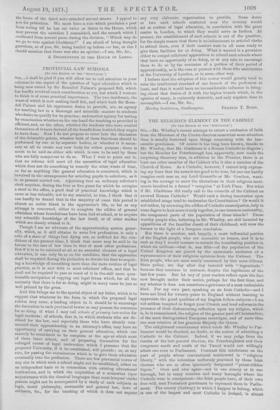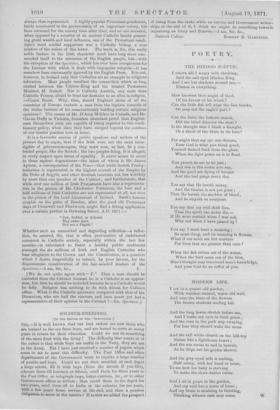THE RELIGIOUS ELEMENT IN THE CABINET.
[TO TEE EDITOIL Or VIE " SPECTAT011.1
SIR,—Mr. Whalley's recent attempt to extort a confession of faith from the Ministers of the Crown deserves somewhat more attention
than is usually bestowed upon things emanating with the hon- ourable gentleman. Of course it has long been known, thanks to Mr. Whalley, that Mr. Gladstone is a Roman Catholic iu disguise ; but the Member for Peterborough has, apparently, now made tho surprising discovery that, in addition to the Premier, there is at least one other member of the Cabinet who is also a member of the Church of Rome. As a Catholic, however, I cannot help express- ing my fears that the news is too good to be true, for one can hardly imagine such men as, say Lord Granville or Mr. Goschen, wante ing in the courage to avow the alterations in their religious senti- ments involved in a formal " reception " at York Place. But what if Mr. Gladstone did really call to the councils of the Cabinet an avowed Roman Catholic? Would such a daring innovation upon established usage tend to undermine the Constitution? Or would it not rather, by crowning the edifice of Catholic emancipation, help in some degree to knit more closely together, in one common nationality, the component parts of the population of these islands? Those worthy people who, believing in Mr. Whalley, are still haunted by apparitions of the familiar Jesuit of their childhood, will view the former in the light of a foregone conclusion.
But there is another, and, happily, a more influential portion of the English people, who aro amenable to reason, and it is to await as they I would venture to submit the humiliating position in which six millions—that is, one fifth—of the population of the United Kingdom are placed by the systematic exclusion of a representative of their religious opinions from the Cabinet. The Irish people, who are most nearly concerned by this most illiberal State policy, are day after day taunted with " ingratitude" because they continue to murmur, despite the legislation of the last few years. But let any of your readers reflect upon the fact now brought uuder their notice, perhaps for the first time, and say whether it does not constitute a grievance of a most undeniable kind. For my own part, speaking as an Irish Catholic—and I have not lived for twenty-years in England without learning to appreciate the good qualities of my English fellow-subjects-1 am not seldom tempted to forget your Church and land reforms in the presence of their dishonouring reflection upon my religion, which is, be it remembered, the religion of the greater part of Christendom, of the most distinguished European sovereigns, and of more than one near relative of her gracious Majesty the Queen. The enlightened constituenoy which sends Mr. Whalley to Par- liament would be shocked, no doubt, at the notion of admitting a Catholic to the Cabinet. Indeed, if we may judge from the results of the last general election, the Petprburghians and their congeners north and south of the Tweed would not willingly admit one even to Parliament. Contrast this intolerance on the part of people whose conventional watchword is " religious liberty," with the toleration uniformly practised by those Irish electors who are so often ignorantly designated "priest-ridden bigots." Over and over again—not in one county or in one borough, but in many counties and many boroughs where the Catholic vote is omnipotent—the Irish people have, of their own free-will, sent Protestant gentlemen to represent them in Parlia- ment. The county (Galway) to which I happen to belong, which is one of the largest and most Catholic in Ireland, is almost always thus represented. A highly popular Protestant gentleman, lately nominated to the governorship of an important colony, has been returned for the county time after time, and on one occasion, when opposed by a member of an ancient Catholic family possess- ing great wealth and local influence, one of the Protestant candi- date's most cordial supporters was a Catholic bishop, a near relative of the writer of this letter. The truth is, Sir, this really noble feature in the Irish character must have long since com- mended itself to the attention of the English people, but—with the exception of the Spectator, which has ever been conspicuous for the fairness with which it deals with unpopular subjects—it has somehow been customarily ignored by the English Press. It is not, however, in Ireland only that Catholics set an example in religious toleration. Most people recollect the conflation which so long existed between the Citizen-King and his trusted Protestant Minister, M. Guizot. Nor is Catholic Austria, any more than Catholic France, afraid to trust her destinies to an alien in religion, —Count Beat. Why, then, should England alone of all the countries of Europe exclude a man from the highest councils of the realm because of his conscientiously holding certain religious opinions? The career of Mr. D'Arey M‘Ghee iu Canada, and Mr. Crayon Duffy in Victoria, furnishes abundant proof that English- men themselves even are capable of rising superior to this tradi- tionary policy, when once they have escaped beyond the confines of our insular position here at home.
It is a favourite maxim of public speakers and writers of the present day to argue, that if the Irish were not the most incor- rigible of grievancemongors, they must now, at last, be a con- tented people, like the Scotch ; the two peoples being, it is alleged, in every respect upon terms of equality. It never seems to occur to those sapient dogmatizers—the latest of whom is Mr. James Aytoun, a correspondent of the Times—that while Scotch Presby- terianism is represented in the highest council of the Empire by the Duke of Argyle, and other Scottish interests not less worthily by more than one member of the Cabinet ; and furthermore, that while over one million of Irish Protestants have also a representa- tive in the person of Mr. Chichester Fortuscue, the four and a half millions of Irish Catholics are not represented at all, not even in the person of the Lord-Lieutenant of Ireland. Swift's famous couplet on the gates of Bandon, after the good old Protestant days of Cromwell and Fleetwood, might find a fitting application over a certain portico in Downing Street, A.D. 1871 :— ",Jew, Infidel, or Atheist May enter hero, But not a Papist."
Whether such an unmerited and degrading reflection—a reflec- tion, be assured, Sir, that is often provocative of embittered comment in Catholic society, especially within the last few months—is calculated to foster a healthy public sentiment amongst the six millions of Irish and English Catholics who bear allegiance to the Crown and the Constitution, is a question which I desire respectfully to submit, by your favour, for the dispassionate consideration of the fair-minded readers of the
Spectator.—I. am, Sir, &e., h. [We do not quite agree with " F." That a man should be excluded from the Cabinet because he is a Catholic is Mk oppres- sion, but that he should be included because he ie a Catholic would be folly. Religion has nothing to do with fitness for Cabinet office. What is the Catholic grievance compared with that of the Dissenters, who are half the electors, and have never yet had a representative of their opinion in the Cabinet ?—En. Spectator.]































 Previous page
Previous page